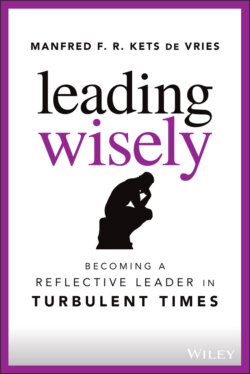Читать книгу Leading Wisely - Manfred F. R. Kets de Vries - Страница 10
My agenda
ОглавлениеAs I have mentioned before, this book should be seen within the context of my discussions with my students about what lessons of life have been important to them in running their organizations. I kept on asking them, as a leader, what would they do to be more effective? What could they do to contribute to creating a better world? What words of wisdom had stuck with them?
In distilling the essence of these discussions, for reasons of simplicity, I have decided to limit myself to eight lessons that pertain to wisdom in the context of leadership and other life challenges. I am quite cognizant of the fact that I could have included more lessons on wisdom, but many of the additional lessons are intertwined within the others. Wisdom, in the end, is a kind of enigma and we need to recognize that from the start. To that end, I have added three chapters upfront where I present some of my more general reflections pertaining to the wisdom equation.
Furthermore, to clarify even more what I want to say, I have included many short stories and anecdotes originating from China, Japan, the Middle East and Europe. The main protagonists in these stories are the Buddha, Zen masters, Aesop (a storyteller believed to have lived in ancient Greece) and mullah Nasrudin (a wise man born in present-day Turkey). Also, included are anecdotes from the Old Testament, the brothers Grimm and a few more contemporary tales. In addition, in each chapter I have added a number of questions to help the reader further explore the various themes that are being discussed.
Given the clinical lens that I often use to make sense of the puzzles that life presents to us, it is important to note that wisdom lies not just in seeing things but also in seeing through things. Of course, it often requires wisdom to recognize wisdom. When touching on this subject, I like to tell my students that the gateways of wisdom are always open, but you have to be willing to walk through them. Moreover, while taking this walk, you need to be prepared to make wise choices. You need to be able to set your priorities wisely. In that respect, the following story could be quite illuminating:
A professor stood before his philosophy class to begin his lecture. To start his class – without saying a word – he picked up a very large and empty bowl and proceeded to fill it up with large pebbles. Having done so, he asked the students if the bowl was full. All of them agreed that it was the case. Giving his students a big smile, their professor then picked up a bag of sand, to put them in the bowl. Quite easily, the sand found space between the pebbles. Again, the professor asked the students if the bowl was full. Once more, all of them thought that the bowl would now be completely full.
Subsequently, the professor took out a jar of water, to also pour it into the bowl. Without difficulties, the water found space between the pebbles and the sand. Sounding like a broken record, the professor asked once again if the bowl was full. Somewhat surprised, the students responded affirmatively.
‘Now,’ said the professor, as they stopped smiling. ‘Look at the way I handled the pebbles, sand and water as your journey through life. These big pebbles are the important things you're dealing with. I am thinking of your family, your friends, your health, your passions and your concerns for society at large. The things that make for a full and complete life. The sand represents the other things that matter, like your job, your house, your car and various other things.’
‘The water is everything else – the smaller stuff. If you put the water into the bowl first,’ he continued, ‘there is no room for the sand or the pebbles. The same can be said about your life. If you spend all your time and energy on the smaller stuff, you will never have room for the things that are really important to you. It doesn't show wisdom. Thus, always pay attention to the things that make a difference; the things that make you feel alive. Consequently, have a good relationship with your partner. Enjoy the time of playing with your children. Try to maintain good relationships with your friends. Don't forget to take care of your health. Furthermore, pursue your desire to create a better society. There will always be time to take care of the smaller things. Make the pebbles your first priority – those are the things that really matter. Keep on reminding yourself that the sand and the water are of much less importance.’
